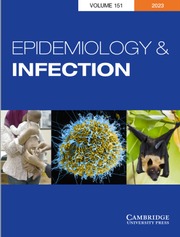Article contents
Is Infantile gastro-enteritis fundamentally a milk-borne infection?
Published online by Cambridge University Press: 15 May 2009
Extract
1. One per cent of samples of farm milk were found to contain pathogenic varieties of Bacterium coli of the O groups associated with infantile gastroenteritis.
2. Unheated cows' milk is a dangerous food for babies.
3. Summer diarrhoea was probably, for the most part, milk-borne infection by special O groups of Bact. coli.
4. Thirteen per cent of chickens on farms were found to be excreting Bact. coli of the O groups associated with infantile gastro-enteritis but only a few of the strains possessed H antigens of varieties known to have an association with human disease.
5. Possible reservoirs of infection cannot be adequately searched for until a selective method is devised to aid the separation of pathogenic O groups of Bact. coli from the non-pathogenic.
Information
- Type
- Research Article
- Information
- Copyright
- Copyright © Cambridge University Press 1956
References
REFERENCES
- 9
- Cited by

